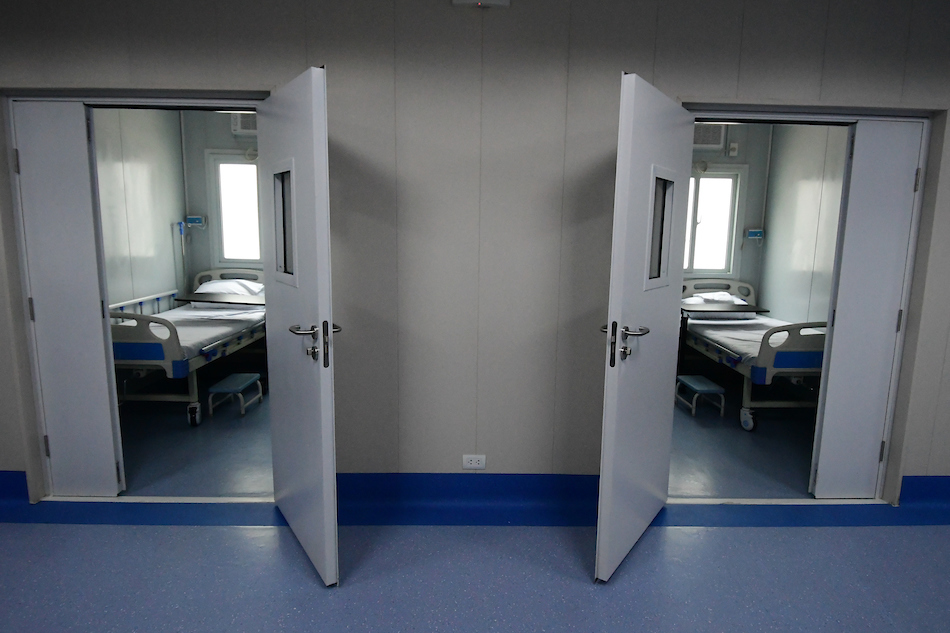DOH: COVID patients should continue to isolate | ABS-CBN

Welcome, Kapamilya! We use cookies to improve your browsing experience. Continuing to use this site means you agree to our use of cookies. Tell me more!
DOH: COVID patients should continue to isolate
DOH: COVID patients should continue to isolate
Rowegie Abanto,
ABS-CBN News
Published Jul 31, 2023 11:42 AM PHT
|
Updated Jul 31, 2023 11:50 AM PHT
MANILA — COVID patients should continue to isolate despite the country's lifting of the public health emergency for the coronavirus pandemic, the Department of Health has said.
MANILA — COVID patients should continue to isolate despite the country's lifting of the public health emergency for the coronavirus pandemic, the Department of Health has said.
In a Department Circular dated July 23, the DOH detailed its updated isolation and mask rules for confirmed cases of COVID-19.
In a Department Circular dated July 23, the DOH detailed its updated isolation and mask rules for confirmed cases of COVID-19.
Home isolation for 5 days is required for COVID-positive people, with or without symptoms. But they can end the isolation if they're "fever-free for at least 24 hours" without using medicine such as paracetamol.
Home isolation for 5 days is required for COVID-positive people, with or without symptoms. But they can end the isolation if they're "fever-free for at least 24 hours" without using medicine such as paracetamol.
For moderate to severe COVID infections, isolation is needed for at least 10 days from the start of symptoms.
For moderate to severe COVID infections, isolation is needed for at least 10 days from the start of symptoms.
ADVERTISEMENT
According to the updated protocol, all COVID-19 positive cases should wear a well-fitted mask for 10 days.
According to the updated protocol, all COVID-19 positive cases should wear a well-fitted mask for 10 days.
There's no need to quarantine people who are not showing symptoms and had exposure to a COVID-positive individual. However, they should still wear a mask for 10 days.
There's no need to quarantine people who are not showing symptoms and had exposure to a COVID-positive individual. However, they should still wear a mask for 10 days.
MASKING
In public transportation, the DOH said, "Wearing masks is no longer mandatory but not prohibited, especially for those who wish to protect themselves and others from COVID-19 or other respiratory infections."
In public transportation, the DOH said, "Wearing masks is no longer mandatory but not prohibited, especially for those who wish to protect themselves and others from COVID-19 or other respiratory infections."
Wearing of anti-COVID masks is still recommended by the DOH in crowded or poorly ventilated spaces, especially for the elderly, the immunocompromised, people with underlying conditions, pregnant women, the unvaccinated, and symptomatic individuals.
Wearing of anti-COVID masks is still recommended by the DOH in crowded or poorly ventilated spaces, especially for the elderly, the immunocompromised, people with underlying conditions, pregnant women, the unvaccinated, and symptomatic individuals.
"It’s good public health practice to keep that mask on especially if you have someone behind you, in front of you coughing," DOH Secretary Ted Herbosa told ANC on Monday.
"It’s good public health practice to keep that mask on especially if you have someone behind you, in front of you coughing," DOH Secretary Ted Herbosa told ANC on Monday.
While no longer mandatory, the DOH still recommended the continued use of face masks in health facilities to protect vulnerable patients and reduce chances of infection.
While no longer mandatory, the DOH still recommended the continued use of face masks in health facilities to protect vulnerable patients and reduce chances of infection.
"Infection Prevention and Control Committees (IPCC) of health facilities can choose to retain mandatory masking and issue specific guidelines applicable to their facility," it added.
"Infection Prevention and Control Committees (IPCC) of health facilities can choose to retain mandatory masking and issue specific guidelines applicable to their facility," it added.
This month, the Philippines ended its COVID-19 public health emergency status, citing continued vaccination and decreased COVID cases.
This month, the Philippines ended its COVID-19 public health emergency status, citing continued vaccination and decreased COVID cases.
As of Sunday, July 30, the Philippines has 4,427 active coronavirus infections. Since the start of the pandemic in 2020, some 4.17 million Filipinos have contracted the respiratory disease, and 66,592 led to deaths.
As of Sunday, July 30, the Philippines has 4,427 active coronavirus infections. Since the start of the pandemic in 2020, some 4.17 million Filipinos have contracted the respiratory disease, and 66,592 led to deaths.
In May, the World Health Organization said the COVID-19 pandemic no longer constituted a global health emergency, the group's highest level of alert.
In May, the World Health Organization said the COVID-19 pandemic no longer constituted a global health emergency, the group's highest level of alert.
But WHO chief Tedros Adhanom Ghebreyesus warned the decision did not mean the danger was over, cautioning that the emergency status could be reinstated if the situation changes.
But WHO chief Tedros Adhanom Ghebreyesus warned the decision did not mean the danger was over, cautioning that the emergency status could be reinstated if the situation changes.
Read More:
DOH
Department of Health
Ted Herbosa
COVID
coronavirus
COVID-19
COVID-19 pandemic
pandemic
health protocols
DOH protocols
ADVERTISEMENT
ADVERTISEMENT


